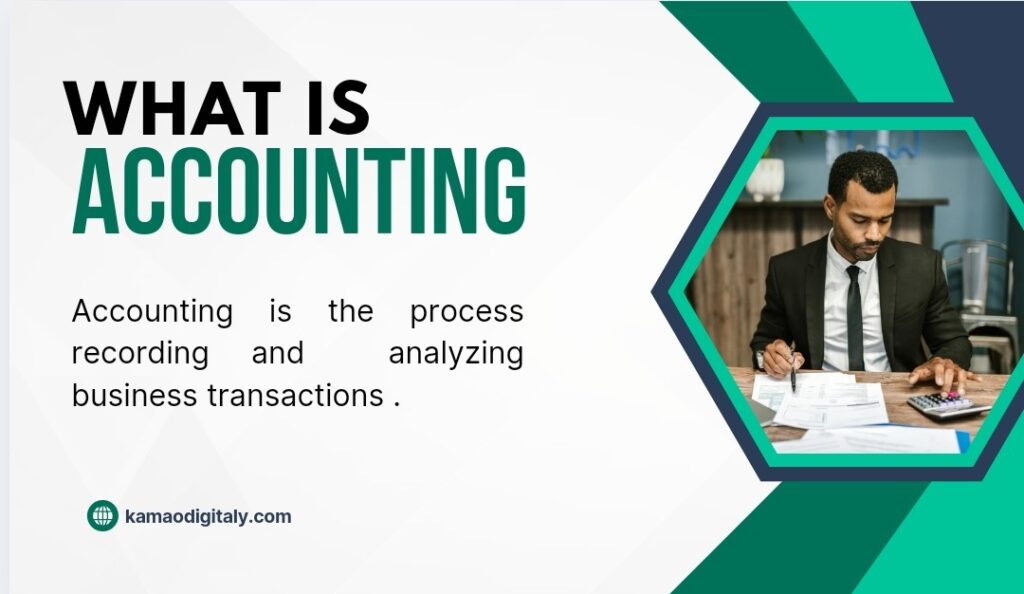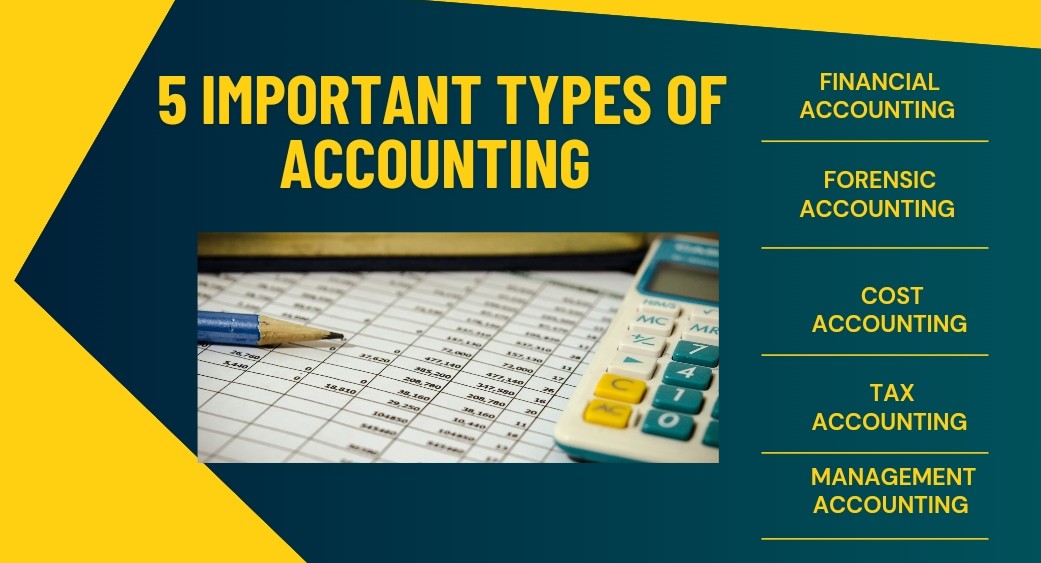In this blog you are going to learn, what is Accounting ? ,why accounting is important and 5 important types of Accounting.
What is Accounting ?

Accounting is the process recording and analyzing business transactions . In simple words we can say that, it is the process of tracking income and expenses of business.
Accounting is the branch of financial services, that focused on organizing and summarizing financial data for companies and individuals.
Accounting in business involve,examining financial data and analyzing the company’s finances and transaction information.
The process of accounting involves summarizing, analyzing, and reporting these transactions to monitor agencies, regulators, and tax collection agencies. Accounting financial statements provide a brief overview of financial activities across an accounting period, including a company’s operations, financial status, and cash flows.
Why Accounting is Important ?
Accounting is important because it helps assure a company’s financial success. Accounting, like budgeting and tracking your spending, is an important part of personal financial success. It guarantees that businesses keep track of their finances, from spending to cash flow.
1. Assure Financial Success
Accounting is important because it helps to assure a company’s financial success. Accounting, like budgeting and tracking your spending, is an important part of personal financial success. It guarantees that businesses keep track of their finances, from spending to cash flow.
2. Helps in Decision Making
Accounting is a very important function for all types of business, It helps business in Decision making,cost planing and measuring economic performance.
Accounting is very important in decision making. It not only reveals the company’s financial health, but it also helps to improve decision-making capabilities. Accounting assists in recording every part of a business, such as money moving in and out, which aids in measuring the company’s profitability.
3. Stay Profitable
Accounting enables businesses to accurately analyze their income, expenses, profit margins, and general financial health.
4. Helps in Making Investment Decision
Accounting helps business executives to examine the possible risks and returns on various investment options by providing thorough financial statements, cash flow estimates, and performance measures.
Making profitable investment decision is important for the success and growth of any organization. And this is where accounting comes in.
Accounting gives organizations significant insights into the various investment possibilities accessible to them and how those investments will affect their financial performance over time.
5. Long Term Planning
Accounting may help businesses in developing informed future financial strategies by examining historical financial data, tracking trends, producing financial projections, and other tasks.
Accounting gives you the resources you need to develop a complete financial plan that aligns with your business goals. Accounting, from budgeting to cash flow management, may assist you in making informed decisions to keep your firm on track.
6. Identify Fraud
Accounting can assist in detecting and preventing fraud within a business.
Accounting is important in business since it detects and prevents fraud inside a company’s operations. Fraud can be disastrous to a firm, resulting in significant financial losses, legal troubles, and a loss of credibility.
Accounting professionals are taught to spot unusual transactions and look into any red flags that may indicate fraudulent conduct.
7. Cash Flow Management
Effective cash flow management is essential for any successful business, accounting serves as the foundation for tracking and controlling cash flows.
Revenue and costs must be accurately and efficiently recorded, and cash reserves must be monitored to ensure long-term development and stability.
Companies that use a thorough accounting system can better forecast their cash requirements, change their plans, and discover potential hazards or opportunities before they become serious concerns. Accounting, with the correct experience and tools, can help firms maintain a consistent supply of cash to keep operations operating efficiently.
Types Of Accounting

There are 5 important types of Accounting. These are –
- Financial Accounting
- Forensic Accounting
- Cost Accounting
- Tax Accounting
- Management Accounting
1. Financial Accounting
Financial accounting is the preparation of financial statements for external stakeholders such as investors, creditors, regulators, and the public.
Main objective of financial accounting is to provide accurate and reliable information about the financial performance and position of an organization over a specific period.
Financial accounting plays a very important role in the economy, as it provides critical information to investors, creditors, analysts, and others.
2. Forensic Accounting
Forensic accounting is used to investigate into the financial records of individuals or corporations. When certain financial information is missing or unavailable for inspection, accountants may need to recreate it.
The purpose of forensic accounting is to collect all relevant documents and accurately and fully account for all transactions in financial statements. These specialists frequently handle legal situations involving fraud, claims, and disputes.
Forensic accounting is a type of detective work in the accounting profession. It involves digging deep into financial records, transactions and reports to uncover fraud, embezzlement or other financial misconduct.
3. Cost Accounting
Cost accounting is a field of accounting that records, analyzes, and reports the costs associated with producing goods or services inside a company.
In simple words we can say that, Its primary purpose is to offer management with exact cost data that may be used for decision-making, cost control, and performance evaluation.
Cost accounting helps in documentation, presentation, and analysis of manufacturing costs. They monitor all variable and fixed expenses to ensure that output corresponds to the product price.
They also helps in management to make future decisions based on financial projections and manufacturing progress. Unit cost calculation methods might differ throughout industries and even within the same organization.
Cost accountants are in charge of implementing, managing, and providing input on cost tracking.
4. Tax Accounting
Tax accounting focuses on the preparation, analysis, and planning of tax-related matters for people, businesses, and companies. “
It involves interpreting and applying tax laws and regulations to ensure compliance while minimizing tax liabilities within the bounds of the law.
Tax accountants assist company in complying with the Internal Revenue Code when completing annual tax returns. They also help businesses plan for future tax returns, such as avoiding particular tax obligations and understanding the consequences of different tax actions. Larger firms frequently hire a tax accountant to help them negotiate the complexity of financial records.
5. Management Accounting
Management accounting gives financial information to an organization’s internal management to help them make decisions and enhance performance.
Management accountants, are unique in the accounting profession because they often work in-house. That is, management accountants work directly for an organization, agency, or businesses.
Common Accounting Terms You Should Know
1. Equity
Equity represents the share percentage of owner in a company. Equity is calculated by the difference between liability and assets.
2. Revenue
Revenue is the total amount of income generated by a business from primary activities such as sales of goods and services ,and from investment.
3. Asset
Asset is the financial resources that is owned by a company.
4. Liability
Liabilities are the amounts you owe to others, such as investors or banks that lend to your company.Liability is financial obligation that a company must fulfill at the end of accounting period of a company.
5. Expense
An expense is that necessitates the outflow of money, or any type of fortune in general, to another person or group in exchange for an item, service, or other category of charges.
For example –
Rent is an expense,Tuition is an expense for both students and their parents.
4. Profit
Profit is the money you have left after paying for business expenses.
